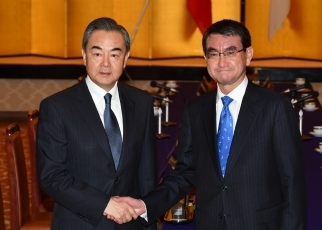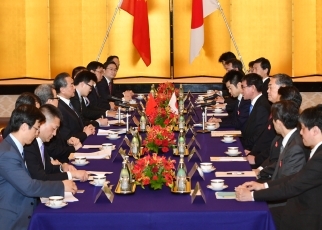Japan-China Relations
Japan-China Foreign Ministers’ Meeting


On April 15, commencing at 4:30 p.m. for a little under four hours, Mr. Taro Kono, Minister for Foreign Affairs, held a Japan-China Foreign Ministers’ Meeting and working dinner with Mr. Wang Yi, State Councilor and Foreign Minister for the People’s Republic of China, who is paying a Working Visit to Japan upon invitation by the Minister for Foreign Affairs. The overview is as follows.
1. Japan-China relations
(1) High-level exchanges
The two foreign ministers welcomed the mutual visits by foreign ministers of Japan and China for the first time in nine years, and confirmed the importance of promoting mutual political trust while moving steadily forward with high-level exchanges, including at the leaders’ level, on the basis of peace, friendship and reciprocal cooperation and under the principle of “partners who cooperate together and are not threats to each other,” in order to move ahead with improving the relationship on all fronts this year, the 40th anniversary of the conclusion of the Treaty of Peace and Friendship between Japan and China. In particular, the two sides confirmed the importance of the visit to Japan by H.E. Dr. Li Keqiang, Premier of the State Council of China, which is scheduled to take place accompanying the Japan-China-Republic of Korea (ROK) Trilateral Summit, as the first step, followed by a visit to China by Mr. Shinzo Abe, Prime Minister of Japan, and a visit to Japan by Mr. Xi Jinping, President of China.
(2) Strengthening dialogue and exchanges between diplomatic authorities
In addition to improving the bilateral relationship, the two foreign ministers confirmed the importance of Japan and China standing shoulder to shoulder and jointly engaging with global challenges such as climate change and the sustainable development goals (SDGs) on the basis of the “Mutually Beneficial Relationship Based on Common Strategic Interests,” and that it is also expected by the international community.
Based on this point of view, the two foreign ministers shared the view on the importance of holding dialogues between foreign press secretaries, Japan-China International Law Dialogues, Japan-China Consultations on Disarmament and Non-proliferation, Japan-China Counter-Terrorism Consultations, and regionally-specific policy dialogues on the Mekong region, the Middle East, Africa, Central and South America and other regions.
In addition, the two foreign ministers also shared the view that they will strengthen mutual exchanges between diplomatic authorities.
(3) Strengthening economic relations
The two foreign ministers both welcomed the convening of Japan-China High-Level Economic Dialogue for the first time in eight years on the following day, April 16, and confirmed the importance of strengthening the bilateral economic relationship, including fields such as energy conservation and environment, innovation, medical care and nursing, and finance, and of cooperating together for the prosperity of regional and international communities. Additionally, they shared the view that they will accelerate work on the early signing of the Japan-China Social Security Agreement.
The two foreign ministers confirmed the importance of maintaining a free and fair open trade system based on international rules, including the rules of the World Trade Organization (WTO) and confirmed that they will continue to make efforts together to promote the Regional Comprehensive Economic Partnership (RCEP) and the Japan-China-ROK FTA.
(4) Promoting people-to-people exchanges
The two foreign ministers confirmed that promoting people-to-people exchanges is important for improving national sentiment on both sides, and welcomed that the Inter-Governmental Consultation on Japan-China Cultural Exchange will be held in late April, along with sharing the view that both governments will continue to support anniversary events this year on both sides to celebrate the 40th anniversary of the conclusion of the Treaty of Peace and Friendship between Japan and China.
The two foreign ministers shared the view that they will accelerate work on the early signing of the Film Co-Production Agreement between Japan and China promptly.
The two foreign ministers shared the view on the importance of youth exchanges, regional exchanges, media exchanges and people-to-people exchanges through the Olympic and Paralympic Games that are scheduled to be held in Tokyo and Beijing.
(5) East China Sea
Minister Kono emphasized that there can be no genuine improvement in the Japan-China relationship without stability in the East China Sea, and requested that the Chinese side prevent a recurrence of the circumstances which could undermine improvements in the Japan-China relationship.
The two foreign ministers shared the view that they will continue to communicate through dialogues such as the Japan-China High-Level Consultation on Maritime Affairs, in order to make the East China Sea a “Sea of Peace, Cooperation, and Friendship.”
The two foreign ministers confirmed that they will continue to communicate on the implementation of the “2008 Agreement” on the development of natural resources in the East China Sea.
(6) Defense exchanges
The two foreign ministers confirmed that Japan and China will both work on accelerating preparations for the early launch of the “Maritime and Aerial Communication Mechanism between the Japan-China defense authorities.” They also confirmed the importance of promoting defense exchanges, and shared the view that the diplomatic authorities will support these moves.
2. North Korea issue
The two foreign ministers held an in-depth discussion based on the recent North Korea situation.
The two sides confirmed that the denuclearization of North Korea is a common goal for both countries, and that they will continue to work closely together while fully implementing the relevant United Nations Security Council resolutions.
In addition, Minister Kono explained his expectation for China’s support and cooperation in resolving the abductions issue as quickly as possible.

